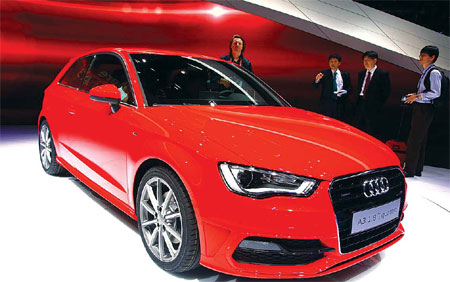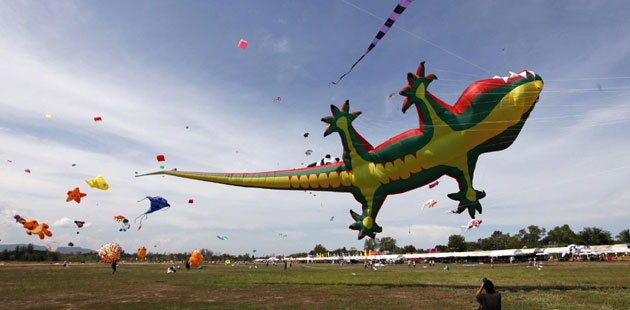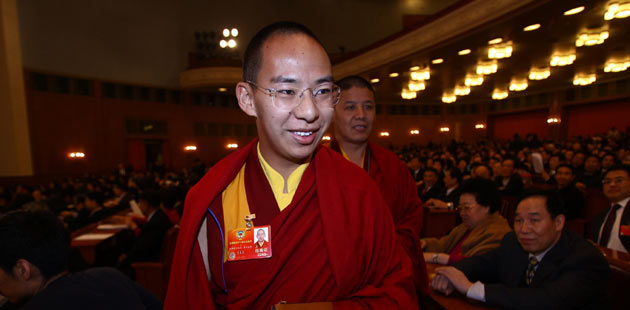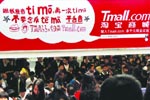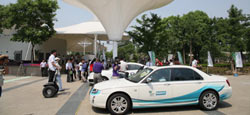Audi: Advanced tech for top market
Updated: 2012-03-19 16:31
By Gong Zhengzheng (China Daily)
|
|||||||||||
|
The all-new A3 made its global debut early this month at the Geneva motor show. [Photos Provided to China Daily] |
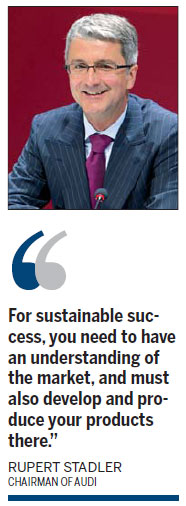
China luxury leader plans boost in manufacturing, more cutting edge models
German luxury carmaker Audi has the tag line "Vorsprung durch Technik", which means advancement through technology.
The brand with four interlocked rings will need to implement the slogan to advance further in the Chinese market, where it vows to maintain its two-decade-long reign.
China is now Audi's largest single market, accounting for almost a quarter of its global sales, so the carmaker will need to speed up localization of its new and mature technologies to meet mounting competition and gain favor with increasingly sophisticated buyers.
As well, the Chinese government has called on foreign automakers to transfer more advanced technologies instead of simply assembling and selling cars in the country.
Audi appears to recognize the importance of the issues and is posed to bring in more technologies.
Michael Dick, Audi's board member for technical development, told China Daily during the recent Geneva motor show that the company plans to produce the all-new A6 plug-in hybrid long-wheelbase sedan in China in 2015, making the country Audi's first market in the world to the model.
More importantly, he said Audi will also make spare parts for the A6 plug-in hybrid in China.
"China will be the test market for the long-wheelbase A6 plug-in hybrid. Based on market feedback, we will decide to choose the long wheelbase or normal wheelbase version of the model for other markets," Dick said.
BMW plans to produce a 5 Series plug-in hybrid sedan next year in China. The model made its global premiere last year during the Shanghai auto show.
Mercedes-Benz is also likely to make the E-Class plug-in hybrid sedan in China in the years to come.
Audi will launch the locally made new A6 long-wheelbase sedan with a conventional petrol engine in China at the end of this month.
The first foreign luxury brand with local production, the company started building cars in the northeastern city of Changchun at a joint venture with its parent Volkswagen Group and Chinese partner FAW Corp two decades ago.
In an interview during a global press conference in Germany at the end of February, Audi Chairman Rupert Stadler said the company plans to invest 3 billion euros ($3.9 billion) over the next five years to introduce a slew of new products into the joint venture in China.
More dealerships
"We're planning to nearly double our dealer network in China by the end of 2013. For sustainable success, you need to have an understanding of the market, and must also develop and produce your products there," Stadler stressed.
Audi now has 237 dealerships in China, one of the biggest networks among global luxury carmakers in this market.
The company delivered 313,036 vehicles in China last year, a 37.3 percent surge from 2010. Its global sales rose by 19.2 percent to 1.3 million units.
Stadler said it expects double-digit sales growth in China this year.
In February, Audi's China sales rocketed by 66 percent to a record monthly high of 31,212 units.
Audi announced last year that it will have a manufacturing capacity of 700,000 cars a year in China by 2015, up from almost 300,000 units at present.
Its joint venture now has two plants in Changchun and is constructing a third in the southern city of Foshan in Guangdong province, which will start to make an A3 compact sedan at the end of 2013.
The all-new A3 hatchback made its global debut early this month during the Geneva motor show.
Audi will also introduce the Q3 compact sport utility vehicle into China as an import vehicle this year. The model will be produced in China later.
Referring to the dealer network, Peter Schwarzenbauer, Audi's board member for marketing and sales, said: "We have just scratched the surface in China. We still don't have a foothold in lots of big cities with a population of above 1 million."
- Chen calls on US to loosen restrictions
- Carrefour store closed after TV report
- Reforms are at 'a key stage'
- More fiscal reforms to support market
- Vice-premier Li urges growth mode transformation
- Hotel group develops Chinese brand
- China's consumer price control still priority
- China to further reform fiscal-tax systems
